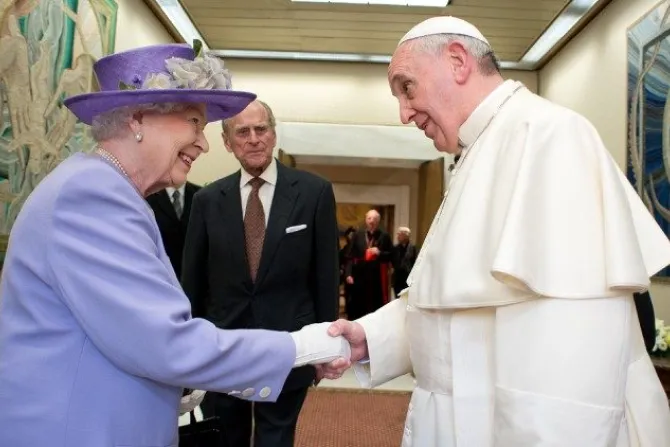Queen Elizabeth greets Pope Francis at the Vatican in 2014. | Vatican Media
Pope Francis in a telegram late yesterday, offered his condolences and prayers upon the death of Queen Elizabeth II, Britain’s longest-reigning monarch and the head of the Church of England. She was 96.
“Deeply saddened to learn of the death of Her Majesty Queen Elizabeth II, I offer heartfelt condolences to Your Majesty, the Members of the Royal Family, the People of the United Kingdom and the Commonwealth,” the pope wrote in the Sept. 8 telegram to Britain’s new monarch, King Charles III.
“I willingly join all who mourn her loss in praying for the late Queen’s eternal rest and in paying tribute to her life of unstinting service to the good of the Nation and the Commonwealth, her example of devotion to duty, her steadfast witness of faith in Jesus Christ and her firm hope in his promises.”
Ascending to the throne in 1952, Queen Elizabeth II met five different popes during her lifetime. When she met with Pope Francis at the Vatican in April 2014, she gave the pope a food hamper filled with local delicacies and a bottle of Balmoral whiskey — from the same region in Scotland where she died on Thursday. The meeting between Elizabeth and Francis marked the 100th anniversary of the re-establishment of diplomatic relations between the United Kingdom and the Holy See.
Pope Francis concluded his telegram to the new king by praying for the queen’s soul.
“Commending her noble soul to the merciful goodness of our Heavenly Father, I assure Your Majesty of my prayers that Almighty God will sustain you with his unfailing grace as you now take up your high responsibilities as King. Upon you and all who cherish the memory of your late mother, I invoke an abundance of divine blessings as a pledge of comfort and strength in the Lord,” the pontiff wrote.
In June, Pope Francis sent a congratulatory message to the Queen as the U.K marked the 70th anniversary of her reign.
As queen, Elizabeth served as de facto head of the Anglican Church. Her title “Defender of the Faith and Supreme Governor of the Church of England” dates to the reign of King Henry VIII. As such, she appointed archbishops, bishops, and deans of the Church of England and presided over the opening of their General Synods.
She was a vocal proponent of the practice of religion, whether it was Anglican or not. She used her Christmas Day message to call for interfaith harmony. On the occasion of the Diamond Jubilee marking the 60th year of her reign in 2012, she and the duke of Edinburgh attended a multi-faith reception at Lambeth Palace hosted by the archbishop of Canterbury.
“Faith plays a key role in the identity of millions of people, providing not only a system of belief but also a sense of belonging. It can act as a spur for social action,” the queen said at the time.
“Indeed, religious groups have a proud track record of helping those in the greatest need, including the sick, the elderly, the lonely, and the disadvantaged. They remind us of the responsibilities we have beyond ourselves,” she said.
In matters of personal faith, the queen was said to have been deeply religious. The Washington Post reported that, according to Oxford University theology professor Stan Rosenberg, the queen had “a deep vibrancy of faith” and “read Scripture daily, attended church weekly, and regularly prayed.”
In 2010, she welcomed then Pope Benedict XVI to the UK, the first state visit of a pope to the country. St. John Paul II had visited the U.K. and met with the queen in 1982, but his was a pastoral rather than a state visit.
Source: CNA

